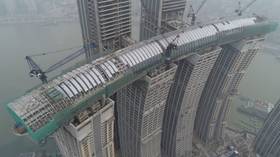New Silk Road: Russia to build 2,000km highway linking Europe and China
Prime Minister Dmitry Medvedev has approved the construction of a new tolled motorway across Russia designed to significantly shorten cargo routes, local media reported. The project is expected to cost around $9.5 billion.
The massive infrastructure project, the Meridian highway, has won the support of the Russian government, Vedomosti business daily said, citing government officials. The highway is set to stretch over 2,000km from the Belarus border to the frontier with Kazakhstan, and it is expected to become part of the fastest trucking route between China and Europe.
🧐>>#MeridianHighway >>#Russia Approves a #Europe-#China Highway https://t.co/TCrTj8hF63#geopolitics#tradepic.twitter.com/Pa7DvPxJjr
— 𝕮𝖍𝖎 🛢️ (@chigrl) July 9, 2019
The motorway will reportedly cost around 600 billion rubles ($9.5 billion). The project’s operator has already bought out around 80 percent of the land required for the construction of the road.
Also on rt.com Connecting Russia: First railroad span across Crimean Bridge completeWhile the construction will fully rely on investors’ funds without taking money from the Russian budget, the government has pledged to assist with attracting new investment for the project, including from China. However, investors want the government to ensure their minimal revenue of around $550 million, covering not commercial but political risks such as the closure of state borders.
Given that tolls will be charged for trucks and cars, as well as the large capacity of the highway, the project is expected to break even in 12 years.
Also on rt.com Future Moscow skyscraper to become Europe’s tallest residential complexThe Meridian highway falls under China’s ambitious transcontinental trade and infrastructure project called One Belt, One Road, which Russia supports. In April, Russian President Vladimir Putin visited China and took part in the second Belt and Road Forum for International Cooperation. Back then, he said that the Chinese initiative will strengthen “the constructive cooperation” of the Eurasian states and will ensure sustainable economic development and economic growth in the region.
For more stories on economy & finance visit RT's business section














